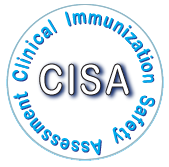Clinical Immunization Safety Assessment (CISA) Project
CDC’s Clinical Immunization Safety Assessment (CISA) Project was established in 2001 to address the unmet vaccine safety clinical research needs of the United States.
CISA is a national network of vaccine safety experts from the CDC’s Immunization Safety Office (ISO), seven medical research centers, and other partners, which provides a comprehensive vaccine safety public health service to the nation.
 To request a CISA Clinical Consultation:
To request a CISA Clinical Consultation:
Current CISA Project Sites
- Boston Medical Center
- Cincinnati Children’s Hospital Medical Center
- Columbia University
- Duke University
- Johns Hopkins University
- Kaiser Permanente Northern California
- Vanderbilt University
CISA addresses vaccine safety issues, conducts high quality clinical research, and assesses complex clinical adverse events following vaccination. CISA facilitates CDC’s collaboration with vaccine safety experts at leading academic medical centers and strengthens national capacity for vaccine safety monitoring. The CISA Project provides consultation to US clinicians who have vaccine safety questions about a specific patient residing in the US. In addition, CISA provides consultation to US healthcare providers and public health partners on vaccine safety issues, and reviews clinical adverse events following immunization ( AEFI) involving the US-licensed vaccines.
About CISA
Mission
- To improve understanding of AEFI at the individual-patient level
CISA Goals
- To serve as a vaccine safety resource for consultation on clinical vaccine safety issues, including individual case reviews, and to assist with immunization decision-making
- To assist the Centers for Disease Control and Prevention (CDC) / Health and Human Services (HHS) and partners in developing strategies to assess individuals who may be at increased risk for AEFI
- To conduct studies to identify risk factors and preventive strategies for AEFI, particularly in special populations
CISA Current Activities
Clinical Case Reviews: CISA provides a clinical case evaluation service for US healthcare providers who have vaccine safety questions about a specific patient residing in the US. CISA provides clinical expertise in various disciplines, including neurology, allergy, immunology, pediatrics, hematology, and obstetrics/gynecology.
Expert Evaluation of Vaccine Safety Issues: CISA experts provide advice that has led to a broader understanding of vaccine safety issues and informs clinical or public health practices. CISA has also reviewed technical issues and contributed to Advisory Committee on Immunization Practices (ACIP) recommendations.
Research: To advance knowledge of vaccine safety and inform clinical and public health practice clinical research is essential. CISA has published and continues to develop research studies that address vaccine safety priorities, such as those identified in the US National Vaccine Plan.
Current priority areas for CISA research studies include influenza vaccine safety, vaccine safety in persons with autoimmune diseases, and vaccine safety in pregnant women. CISA complements other vaccine safety systems and focuses its efforts on scalable, prospective studies for US-licensed vaccines. These studies are designed to address clinical vaccine safety questions in targeted or special populations that are often excluded from pre-licensure clinical trials. CISA is well suited to study more common, non-medically attended events (e.g., fever) and to collect biological specimens after vaccination. CISA investigators also have access to special populations (e.g., persons with autoimmune diseases) and specialists who care for these patients.
Public Health Response: CISA has procedures in place to assist in response to vaccine safety emergencies, such as a pandemic, and to assist state health departments during an emergency.
- Page last reviewed: August 28, 2015
- Page last updated: August 28, 2015
- Content Source:


 ShareCompartir
ShareCompartir